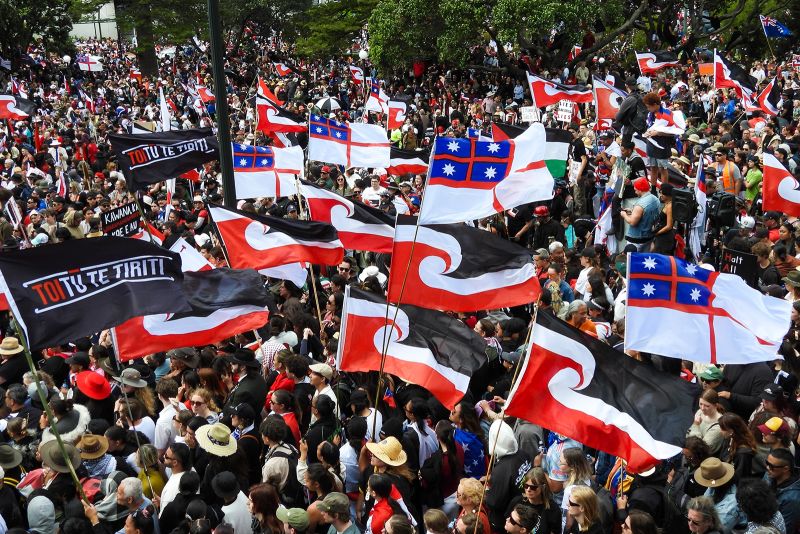
New Zealand politicians sing as bill that sparked massive protests is ‘annihilated’
New Zealand politicians broke out in song Thursday after striking down a right-wing-backed proposal that opponents feared would erode indigenous rights.
Tens of thousands of people – predominantly from the Māori community – had already taken to the streets to oppose the bill, which sought to redefine the terms of a treaty that British colonialists signed with the indigenous group more than 180 years ago.
The proposal made global headlines when a video went viral of the nation’s youngest legislator tearing the bill in two and leading a haka – a ceremonial Māori dance – in parliament.
As the bill was voted down by 112 votes to 11 on Thursday, after an occasionally heated session, politicians from both sides of the house sang a Māori song, or Waiata, in celebration, marking the end of a bitter public debate.
“This bill hasn’t been stopped, this bill has been absolutely annihilated,” said Hana-Rāwihti Maipi-Clarke, the MP who led the parliamentary haka during the earlier debate.
The Treaty Principles Bill sought to define the principles of the Treaty of Waitangi – an agreement signed between the British Crown and a group of indigenous Māori leaders in the 1840s, which formalized New Zealand as a British colony and reserved Māori land and customary rights.
Its proponent, David Seymour, argued parliament needed to define the principles of the treaty because definitions currently only existed in a series of court rulings made over decades – rather than in an act of parliament.
His ACT Party – a minority party in the right-wing governing coalition – believes the current law has led to a society where Māori have been afforded different rights and privileges to non-Māori in New Zealand.
Opponents said the courts had already settled the principles of the treaty and that the draft list Seymour put forward would erode indigenous rights and harm social cohesion.
Speaking in parliament on Thursday, Labour MP Willie Jackson called the bill “right-wing obscenity, masquerading as equality.”
Labour’s leader Chris Hipkins, the former prime minister, said the debate would be a “stain on the country” and called the proposed law change a “grubby little bill, born of a grubby little deal.”
The bill was allowed to pass through to the select committee stage because the ACT Party had made it a condition of the coalition deal that helped put Prime Minister Christopher Luxon’s ruling National Party into power.
But the Nationals and the other party in the coalition, New Zealand First, never agreed to support the bill beyond the select committee stage. Luxon had tried to publicly distance himself and his party from it.
Despite the overwhelming opposition, Seymour has vowed to “never give up” on his efforts to change the law.
“The idea that your race matters is a version of a bigger problem, it’s part of that bigger idea that our lives are determined by things out of our control,” he said in parliament on Thursday.
‘Cremation day’
Prime Minister Luxon was not present in parliament as the bill was voted down, drawing the ire of those behind the public campaign against it.
“If you’re the leader of this country and you’ve got a Bill in Parliament that had 300,000 submissions made on it, which broke every single record by a country mile, you would think that the leader of our country would want to be in Parliament for an occasion that big,” Tania Waikato, a lawyer for the Toitū te Tiriti campaign, told RNZ.
